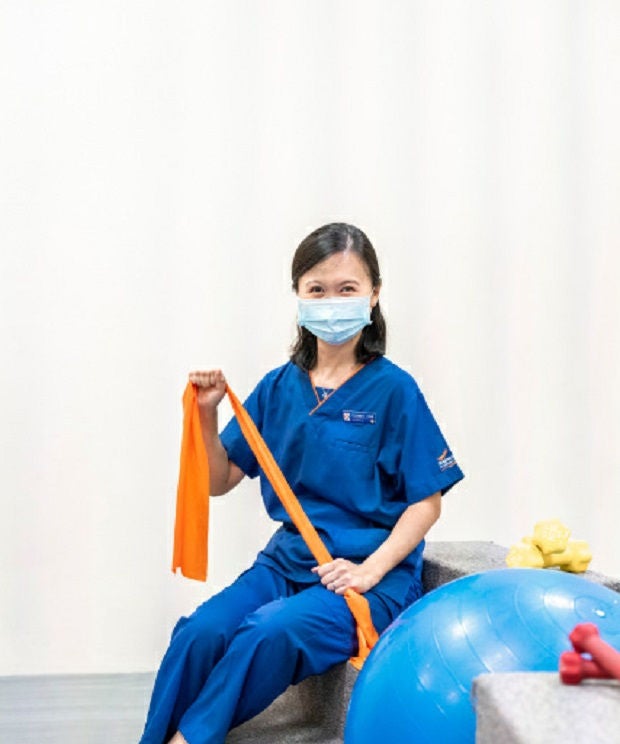
For KK Women’s and Children’s Hospital (KKH) Senior Principal Physiotherapist Ms Elizabeth Chan, the interest to pursue physiotherapy for cancer patients as a subspecialisation was sparked when she was still an undergraduate, following a clinical attachment at an oncology ward. This was unsurprising given her empathetic nature, selflessness, and inherent sensitivity towards others.
“When patients are diagnosed with cancer, they often go through a long and difficult journey. I wanted to use physiotherapy to support them through it,” said the 38-year-old.
Having joined KKH’s Physiotherapy Department 15 years ago, Ms Chan now heads a team focusing on women’s health. She oversees the daily operations of her team, and steps in to troubleshoot when needed. The team provides care for female patients with a wide range of conditions requiring physiotherapy support, including those diagnosed with cancer.
Ms Chan sees about six to eight patients a day, spending up to an hour with each of them, depending on their condition.
Every step of the way
Ms Chan begins journeying alongside her patients even before they are diagnosed with cancer.
When patients get hospitalised and are awaiting the investigation results for their diagnosis, she prescribes exercises to improve their mobility and prevent deterioration of their physical function during the hospital stay. If they require surgery, she helps them get physically fit for it, so as to speed up their recovery process.
After their surgery, Ms Chan recommends movement and pain relief strategies so that patients can gradually resume their functional movements and daily activities.
Most patients undergo further treatment, such as chemotherapy, radiotherapy, and endocrine therapy, which may have side effects. Lymphoedema, or long-term swelling of the arm or leg, is one example of such side effects.
“I saw how the condition greatly affects patients’ daily lives and I wanted to help them in some way, so I chose to specialise in the field of lymphoedema management,” said Ms Chan.
She performs lymphatic drainage techniques on these patients to reduce swelling, and prescribes the appropriate type of compression to maintain or further bring down the swelling. She also teaches them exercises and self-care tips, including a simplified version of the lymphatic drainage technique, so that they can better manage their swelling.
“We focus on using compression to enhance blood and lymphatic circulation. I provide them with stockings or compression garments, and teach them how to use compression bandaging, which is an important component of the treatment.”
Coming to terms
In this line of work, Ms Chan understands that some of her patients will inevitably lose the battle against cancer. Nevertheless, she strives to help them cope with symptoms, such as pain and swelling, so that they can be as comfortable as possible in their last days.
“After building such a strong rapport with them over the years, it is heartbreaking to witness their fight coming to an end. But knowing that they have come to some form of acceptance helps me get through the situation. I feel privileged to be a part of their lives,” she said.
Passion to serve
Apart from her work with cancer patients, Ms Chan also helps women who suffer from osteoporosis. For these patients, exercise is a vital part of their treatment. Prior to the COVID-19 pandemic, Ms Chan would conduct group exercise classes for women with low bone mass. Currently, the team is looking to resume some of these group sessions virtually and in a safe manner to enable patients to continue exercising.
“For a whole hour, we exercise together, and this experience is complete with background music. I modify the exercises to make sure they are safe even for the elderly. But do not underestimate them — some of them are pretty fit even though they are in their 70s!”
Outside of work, she finds time to volunteer at the Women’s Cancer Support Group and the KK Alpine Blossoms Breast Cancer Support Group. She conducts training and exercise sessions there, sharing tips with patients along the way.
“This is my way of giving back. Knowing that the nuggets of information I share motivate some patients to start or resume some form of physical activity encourages me to continue giving my time to these causes,” she said.
Her passion for her patients shines through. Last year, Ms Chan was pleasantly surprised to receive the Efficiency Medal at the National Day Awards. The award is given to those who show exceptional devotion to duty or for work of special significance.
“It is very meaningful to be there for patients at the lowest point of their lives. We must stand by them, support them through the difficult times, and help them look ahead to their recovery.”













 Get it on Google Play
Get it on Google Play